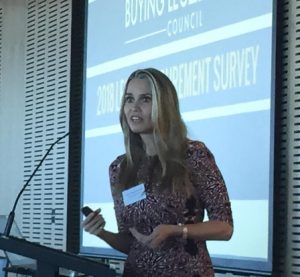On September 5-6, Evolve the Law attended Buying Legal Council’s 2018 Legal Procurement North American Conference in New York. The conference brings together decision makers from corporations, law firms and legal service providers to share best practices and thought leadership on sourcing legal services and managing supplier relationships. We caught up with  Dr. Silvia Hodges Silverstein, the executive director of Buying Legal Council, the international trade organization for legal procurement to learn more about legal procurement and the impact it is having on the legal industry.
Dr. Silvia Hodges Silverstein, the executive director of Buying Legal Council, the international trade organization for legal procurement to learn more about legal procurement and the impact it is having on the legal industry.
ETL: For the uninitiated, how would you, at a high level, define the discipline of legal procurement?
SHS: Legal procurement is the professional approach to buying legal services and managing the business side of relationships with law firms and other legal services providers. Procurement compares and contrasts, uses data and develops evidence-based rationale for major reductions in legal spending.
Still a relatively recent phenomenon, legal procurement is quickly gaining traction and growing, particularly among the companies with significant legal spend.
Few today believe that companies will return to source legal services by the legal department alone, without procurement’s involvement. Looking at other professional services beyond legal, it is clear that procurement changed the way these services are bought during the last 25 years. This has occurred in a time sequence: engineering and architectural services since the late 1980s, marketing, public relations and advertising services since the mid-late 1990s, accounting, auditing, and tax services since the early-mid 2000s, and legal services in the last five-plus years.
In many corporations legal services used to be largely exempt from the intense cost scrutiny other business units and functions have been facing for years. The recent financial crisis acted as a catalyst and sped up the process for the adoption of legal procurement, particularly in large corporations. Publicity about billing practices, big ticket spending, and profit pressure is at the root of this seismic shift.
ETL: How would you distinguish procurement from operations?
SHS: Legal procurement managers are professional buyers of legal services. Legal procurement is typically part of the procurement department. Legal procurement reports to the CFO (and Chief Procurement Officer). Most legal procurement managers have a business background.
Legal operations managers on the other hand, are tasked with ensuring that the company’s legal department is well managed. This includes areas like knowledge management, litigation support etc. Legal ops managers are part of the legal department and report to the general counsel. Many of them are lawyers by training.
ETL: There was much discussion at the conference of the idea of “value”– have agreed-upon metrics emerged by which value is measured?
SHS: Value is the extent to which a good or service is perceived by a client to meet her needs/wants and is measured by her willingness to pay for it. Value is not an “absolute” number but depends on the (subjective) perception of the worth of the service.
For any transaction to take place, both the buyer and the seller must profit from the exchange and receive more value (in their subjective perception) than what they are giving up.
Value can be e.g. a low price (think discounting), or “everything I want in a service” (prestige pricing) or “the quality I get for the price I pay” (think market segmentation pricing, price bundling, results-based pricing).
At the Buying Legal Council, Steve Lauer recently presented on how to best measure value. He suggests that value consists of a group of subordinate qualities (the importance of which varies from client to client, matter to matter and in other ways). The overall “value” is the sum of the various value-related qualities that the client considers important for the matter in the context. This can be e.g. “expertise”, “cost control”, “reliability of result” etc.
ETL: Is the increasing influence and traction of procurement professionals necessarily bad news for law firms?
SHS: Procurement makes many new demands on law firms, just like they would on other suppliers. Comparing and contrasting to see if the organization gets a good deal is part of Procurement’s general approach. Until now, this was rarely the case in the legal industry. For firms, this necessitates further investment in professional management, technology, and service delivery to stay competitive. Firms are expected to know their numbers and provide a competitive offering.
Dr. Silvia Hodges Silverstein is the executive director of the Buying Legal Council, the international trade organization for legal procurement, and an adjunct professor at Columbia Law School and Fordham Law School. She can be reached at silvia@buyinglegal.com. Website: www.buyinglegal.com. Twitter: @silviahodges and @buyinglegal








